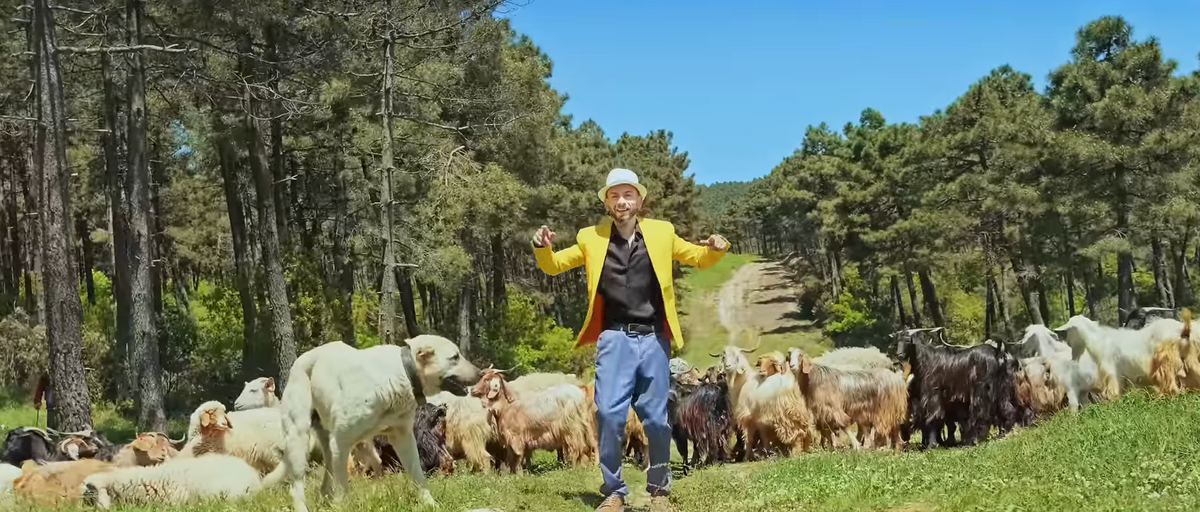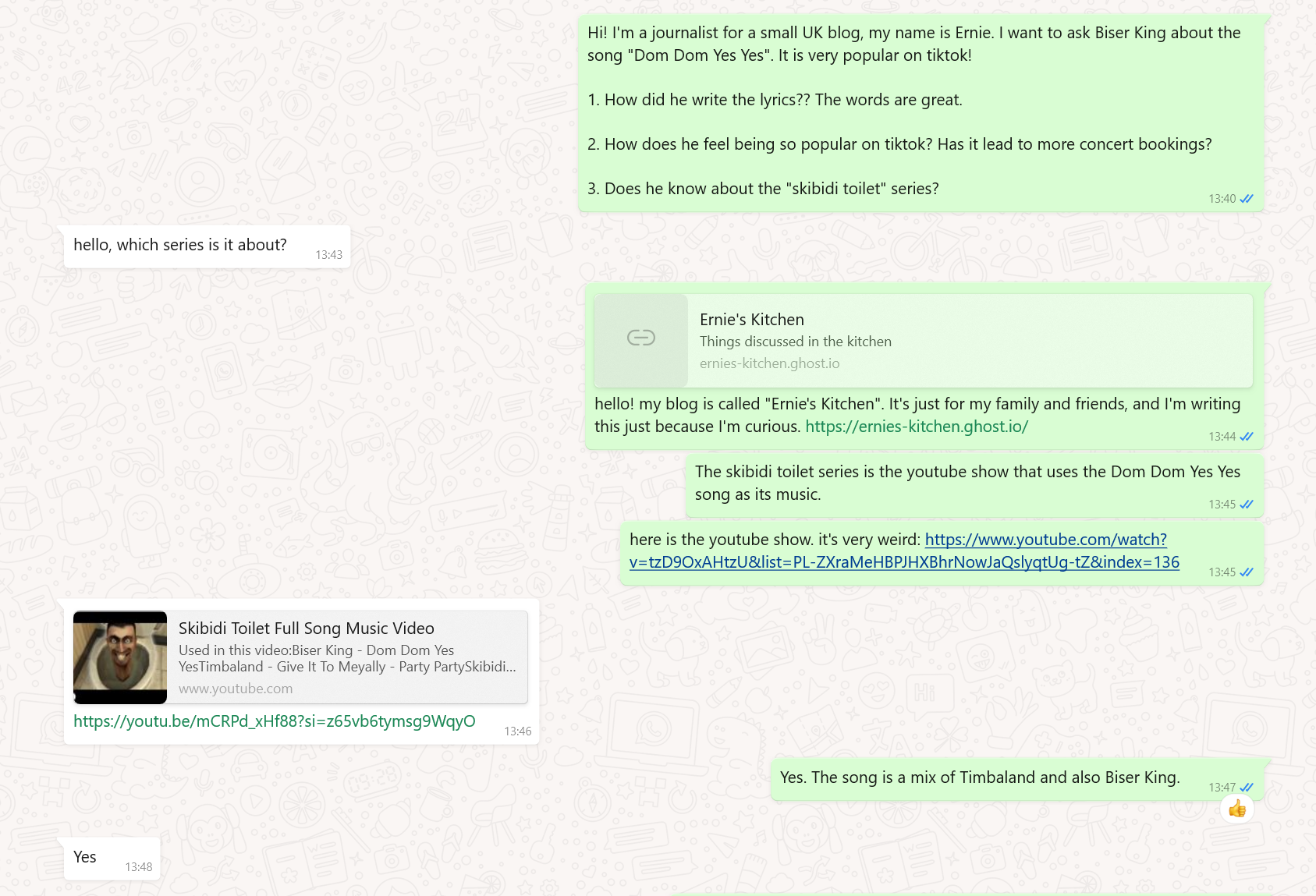Dom Dom Yes Yes No

Here is a nonsense song (actually, nonsense lyrics to an existing song) composed by an anonymous member of Gen Alpha – children and teens – as an in-joke to make Gen Z feel old:
Sticking out your gyatt for the rizzler
You’re so skibidi
You’re so fanum tax
I just wanna be your sigma
Freaking come here
Give me your Ohio
The radio show Reply All used to have a segment called Yes Yes No in which the two hosts would ask their producer if they understood what a thing on the internet meant. The producer often said No, the two hosts often said Yes, hence the name.
We’re going to do that here, because while this song is nonsense, it’s a very interesting kind of nonsense. There are already a few articles out there interpreting this nonsense song, but none of them dig into the truly contorted etymology of some of these terms. At the end, I hope to ask “Are we at Yes Yes Yes?” even though there is only one of me, and hopefully more than two of you.
2023: A Twitch Odyssey
“Rizz” is the Oxford word of the year, beating out terms like “situationship,” (a complicated casual relationship) “beige flag” (a personality trait or habit in a date that’s neither a red flag nor a green flag, but just sort of boring) and “Swiftie” (a devoted fan of bird’s nest soup pop icon Taylor Swift.) It’s short for “charisma” and was coined by YouTuber and Twitch streamer Kai Cenat before rippling out to the rest of the online world. It is a younger person’s word that has been ruthlessly appropriated by the olds.
Kai Cenat is a streamer – 2023’s “Streamer of the Year” – who does pranks, comedy, some hip-hop, and celebrity interviews, akin to what a Howard Stern-model shock jock would have been in the 90s. He also does the standard Twitch thing of letting people watch him play videogames while he makes commentary, which to me seems like the most boring thing in the world, but to each their own I guess. I really do think the only way I can contextualize it is as a radio show. In my understanding most people don’t really watch a Twitch stream in the same way you’d watch TV – you’d just have it on the background while doing something else. He is one of the most popular streamers on Twitch, with approximately 7 million followers, and he is extremely well known among the under 20s crowd. (So I’m told.) Outside of this particular milieu, he’s famous for starting a riot in New York’s Union Square this August when he and fellow streamer Fanum promised a giveaway of PS5s and other gaming equipment. [Yes, Fanum also features in the nonsense song.]
Rizz, as Kai explains on a podcast, was only used in his own circle at first.
“It was only me and a few of my friends from back home, it never got out or nothing” he said. “I started using it on Twitch, ‘I got rizz,’ and my chat was like, wtf?”
“Rizz is like, when you’re talking to a girl, and at first, shit is not going your way. It’s looking bad for you until you spit game. You’re rizzing ‘em up, and now shit is going your way – the girl is asking, “ooo, who is this?”
I asked Arron Williams, my former colleague who is both a forensic linguist and a frequent Twitch user, how that slang might have made the jump from Twitch to the outside world. He told me that while there is a huge amount of slang that stays within the boundaries of the platform, it has two features that help it escape.
“What happens on Twitch finds its way to TikTok and vice versa, so there's an audience overlap,” Arron said. Live moments from streams can get clipped, edited, and turned into a distributable clip on the other big video app.
“But also I would say linguistically the interaction on Twitch makes people pick up the words more,” he said. “You are encouraged to say them and are engaging with others saying them.”
If you’re not familiar, Twitch as a livestreaming platform has a live chat that appears on screen, so that celebrities react to the messages their audiences are sending them. Streamers can create in-jokes and other games, getting their followers to say particular phrases to react to things that the streamer is doing, or vice versa.
“It has that parasocial edge and fast paced interaction,” Arron said. “Also a sense of community because everyone is in on the same joke.” He credits that parasocial interaction with accelerating what would normally be a pretty closed linguistic loop.
“Gyatt” comes from Black communities, and is an abbreviation of “god damn” as an exclamation. It was popularized on Twitch specifically by a streamer going by YourRage, but then made more famous by, again, Kai Cenat. Although it clearly originated as an emphatic, it was only ever used in the context of “wow, that is a big ass,” so “gyatt” by itself gradually took on the meaning “ass.” You can find video compilations of Kai absolutely screaming “GYAAAAATT!!!” when a woman’s midsection comes into view on stream. As a teenage boy, I’m sure I would have found this hilarious. Now, not so much!! I find it more than a little misogynistic!

I ran that by Arron. “On the one hand Twitch discourse and humor relies heavily on sexuality and sex jokes – a lot of streamers endlessly joke about cum for example – that includes female streamers too. People are very open about talking about their bodies on Twitch - it is a lot more normalized. The word gyatt is also used in this joking context a lot.” Everyone apparently uses the word as a mundane stand-in for "butt."
“But then there's also a sub-genre of twitch that also relies on more sexualized content to make money," he said.
On Twitch, popular streamers endlessly have to come up with new gimmicks. Whatever gimmick is currently popular is called the “meta” – and so every big streamer starts doing the same activity to ride the trend. Rather wholesomely, it has been things like “playing chess' in the past. But metas are often more obviously sexual things, like streaming while in the hot tub.
In fact, in the past two days, Twitch has announced that they’ll be allowing “tasteful nudity” on streams. This was followed almost immediately by news of Twitch walking it back, as they didn't mean it was license to distribute softcore porn, and they banned loads of accounts.
Lastly, and briefly, the “Fanum Tax” is whenever fellow streamer Fanum, who recruited Kai Cenat for the YouTube collective AMP, takes a cookie from Kai when he is on stream.
What struck me about all this is that while the internet is still driving the creation of new slang words, it’s no longer happening on the platforms where millennials first colonized and continue to hang out. Oxford’s word of the year for 2022 was “Goblin Mode” coined by trans Twitter shitposter Juniper, and before that, it was “vax”, which came first from the tendency of British english to shorten everything to its bare bones, and then from the great proliferation of facebook groups who proclaimed their grievances against the “vax.” But Twitter and Facebook are dead. In the void they left behind, younger generations used a completely different channel – streaming and TikTok and YouTube.
And there is just not much written about any of these people in conventional media. Twitch is a walled garden. Normally, if there was a TV or radio personality with millions of daily viewers, you’d be able to find coverage in celebrity magazines, discussion of the latest episodes or seasons in cultural journalism, maybe even a profile in a legacy publication. But the people who care about what Kai Cenat are doing don’t get their news from legacy media or celebrity mags, nor do they even get news by the ancient method of reading text. Because he’s a hip hop musician, there has been some coverage in music outlets, but that’s it. Which is why when a word like “rizz” showed up, it seemed to spring out of the ground, fully formed, everywhere all at once – because the people who curate and produce the news aren’t really on Twitch. And that’s because it’s dreadfully boring to anyone over the age of 21.
Arron adds: “A lot of twitch slang are emote names that are emotes people drop in. Gotta pausefish every now and then to keep a streamer on their toes. Y'know how it is.” I did not know how it was.
Belly Dancing
I’m going to take some time to explain here because it has become a cultural phenomenon that far, far outweighs whatever you’re expecting. It does not descend from the song by Russian group Little Big with a catchy dance that I myself performed – although that will make a cameo appearance shortly.
Please watch this video to see where we’re going. Take some time to process your emotions.
This story starts with a song from the Bulgarian Turkish turbofolk singer Biser King called Dom Dom Yes Yes. He’s Romani – or at least I assume so, since he’s singing in the Romani language for at least the first verse. This is the genre known in Bulgaria as “chalga”, from the Turkish çalgı, meaning “instrument.” Chalga is a sexy style of bar music – in Ottoman times, you’d hear something similar in taverns – but now it’s associated with a wild night out at the diskoteka, and potentially some belly dancing.
I could find no verifiable translation of the lyrics. (I don’t even think that Google translates Romani.) Someone on the Turkish gossip forum ekşi sözlük (the sour dictionary, aka the “holy knowledge source” aka the only way to get accurate news in that country) claims it’s something like “touch me all over” and then a bunch of lyrics about cars. Biser King, in a moment of brilliance, throws some English into the chorus: “Brrrrr Skibidi dom dom dom dom yes yes yes yes skibidi dabady dabady yes yes yes yes”. And so on. My brother Jari will enjoy the music video due to the overrepresentation of goats.
A large young Turkish farmer, Yasin Cengiz, took on the belly dancing suggestion. He made a dance video to this breakdown, shaking his girth to the beat in the fields while all his buddies are moving pipes around.
It got wildly, wildly popular. Now this is his job.

Cengiz continues to make ads for kebab restaurants, car detailers, hot air balloon companies and etc throughout the entire middle east, all with the same Biser King song as backdrop. Eksi sozluk weighed in:
You truly never know who will become rich and famous in this life. If you’d told this guy in the past, hey, you’re going to get rich and famous from shaking your belly, he’d say, “what the fuck are you talking about?” But his grandchildren will still be making money off it. I don’t even know what to say.
A Russian DJ called Doombreaker saw Yasin shakin’ it to a song with “skibidi” in the lyrics on his TikTok page, and released two quick joke songs on Dec 28 2022 with Yasin greenscreened into the music videos– one, a callback to Little Big’s Skibidi, which is well known in the Russophone world; one, a mashup with an old Timbaland/Nelly song that was floating around at the time. (Here is a quick musical breakdown of its component parts, if you're interested.)

The bodybuilder and Twitch streamer Paryss Bryanne took that audio and made a meta – we’re going back to that – called a gigachad. A “chad” is a super buff guy, so a gigachad is the exponential version of such a guy. The gimmick there is that you start with a video of your normal face looking happy, or at the very least, unintimidating, and then switch to a shot of yourself looking tough as hell with huge muscles. The face is a crucial component – sucked in cheeks, popped eyebrows, pursed or bulging lips.
A Russian guy living in Georgia who posts as DaFuq!?Boom!, Alexey Gerisamov, saw Bryanne’s clip – which has hundreds of millions of views at this point – and made a quick homage in his chosen medium. He’d used Source Filmmaker, a program that lets users manipulate assets from a ten-year-old videogame, to put a head in a toilet, singing the Biser King mashup song. It looks: horrible.
It was an unexpected hit. He let his imagination get carried away, and started cranking out videos depicting a war between giant heads living in toilets and then guys with cameras for heads, locked in a perpetual arms race. The toilets invade earth and the camera head guys – whose theme song is “everybody wants to rule the world” by tears for fears – try to fend them off. You defeat the toilet guys, of course, by flushing them.
It is one of the most popular shows on YouTube. Like right now at this moment. Gerisamov’s channel has a combined 13.3 billion views. Gen Alpha spends hours every day watching this stuff. There is a fan community posting commentary. There is merchandise. There are about 70 episodes featuring flying toilets verses TV golems. There’s a complex lore to the world, some big unanswered questions – who originally sent the toilet guys to attack earth? – and the perpetually escalating conflict means the camera-heads and the toilet-heads are locked in an arms race that strongly resembles the ways that kids play pretend. (“I’ve got a rocket launcher.” “Ok, I’ve got a MEGA rocket launcher.”) So on the one hand, I get the popularity.
On the other hand, it’s frightening, off-kilter, lo-fi body horror, and I’m faintly disturbed by the whole thing. It reminds me of a great article by James Bindle a few years ago about how algorithmically-optimized animation had so thoroughly polluted the YouTube recommended feed that leaving your kids alone with the iPad meant near-certain exposure to nightmare fuel. So I suppose this is the online milieu that shaped Gen Alpha’s sense of humor, too.
Rise and Grind
I’m going to make the surprising and original argument that gender roles, as portrayed on the internet, are “bad.” Young women learn to contort and distort their bodies for a perpetual male panopticon; boys learn how to be more misogynistic from (alleged) sex criminal Andrew Tate. Both of these are directly tied to forms of consumerism – either Instagram filters that advertise lip fillers and botox, or manfluencers who encourage their audience to buy some array of protein supplements. Being a young man or woman online means not just putting your body on video display, constantly; it means performing the most exaggerated versions of those roles. (Check out Rebecca Jenning's article in Vox about why dating advice on TikTok is so bad for more about this.)
“Sigma” is such a role. A Sigma is a guy outside the Alpha-Beta-Etcetera hierarchy. He doesn’t need the validation of the hierarchy. He’s a lone wolf. He’s a gigachad. The manliest man. Here’s a typical sort of explainer post from a guy on Quora calling himself “Dominant Introvert”:
Is it true that alpha males always outshine sigma males? No. Nine times out of ten, the sigma male always comes out on top and that is because the sigma male never backs down from anyone threatening him. The alpha may provoke the sigma to attack by being physically or verbally aggressive towards him, but the sigma will stand his ground and will strike back only when it is necessary. This kind of reminds me of a story I often play in my head:
Alpha chops a piece of wood in half with his bare hand to show dominance.
Betas applaud alpha.
Sigma doesn't care.
Alpha notices, gets upset and challenges sigma to single hand combat.
Betas are now scared.
Sigma confronts alpha and tells the betas to stand back.
Sigma and alpha get into fighting position.
Sigma gestures to the alpha to make the first strike.
Alpha foolishly takes the bait and throws the first punch.
Sigma counter strikes with a solid kick to the alpha's front knee and testicles, followed by a full blown smack to the alpha's nose.
Alpha falls to the ground and starts crying in pain.
Sigma turns to now scared betas and gives them meaningful life advice.
Sigma goes to get the first aid kit and bandages alpha's wounds.
Betas are now confused AF.
Alpha is even more confused than all the betas combined.
While this stuff is obviously very easy to make fun of, it’s also an example of capitalism run amok. A Dazed article from Gunseli Yalcinkaya last year explains that men trying to be “Sigmas” have wedded themselves to hustle n’ grind culture – every waking moment transformed into productive striving towards physical perfection or material success. Thoughtfulness, empathy, community or even just fun, time-wasting hobbies aren’t worth much to the sigma. Big chin, empty head.

Why did I spend three days writing this? Please help me
Three thousand words later, we are ready to translate our nonsense song.
Sticking out your gyatt for the rizzler
You’re so skibidi
You’re so fanum tax
I just wanna be your sigma
Freaking come here
Give me your Ohio
Most of it is still nonsense. “You’re so skibidi” and “You’re so fanum tax” do not parse. I still don’t know what Ohio is supposed to represent in this song. The first line finally makes sense – sticking out your ass for the person who's got game – and "I just wanna be your sigma" kind of scans. But are we at Yes Yes Yes? Not really. But was John Lennon anticipating anyone would understand “I am the Walrus?” At least he got to take psychedelics when he was writing his nonsense verse.
Again, I do want to emphasize that people are not supposed to understand this song, and understanding it is not by any means a badge of taste. It’s more like the Mark of Cain. Those who bear its knowledge are doomed to wander the earth, babbling phrases like “stand back Betas” to whichever misbegotten stranger they affix with their doleful gaze.
I reached out to Paryss Bryanne, Kai Cenat, Yasin Cengiz, and Biser King for this article. Biser King was the only one to respond. I thought at first I was talking to his publicist, but I realized it was actually just his literal phone number I'd found. He first asked me which series I was talking about, and then texted me a link to Skibidi Toilet. Then he gave me a thumbs up, and said “Yes”. At least he understands the premise of Yes Yes No.

